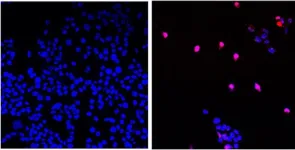(Press-News.org) Despite this prevailing negative sentiment, results showed the public generally think the most suitable punishment for disruptive, non-violent protesters is a fine or lesser penalty than imprisonment.
The research, led by the University of Bristol, suggests public opinion may not be supportive of the Government’s recent legislative changes, through The Public Order Act 2023, which introduce harsher sentences for disruptive protesters.
The online poll, conducted by YouGov this month, surveyed 2,069 adults of all political viewpoints across Britain. It showed an overwhelming 82% of respondents considered climate change to be either very or fairly important.
Overall, 29% of people listed the environment among the top three most important issues facing the country, although the economy (65%), health (42%) and immigration and asylum (36%) were the most popular choices. When asked separately about the importance of climate change, 52% of people said it was very important and 31% said it was fairly important, with only 14% saying it was not important.
However, 68% were found to disapprove of the Just Stop Oil group, which opposes the licensing and production of all new oil, gas, and coal projects – including 44% who held a very unfavourable opinion of the campaign.
Notwithstanding such views, more respondents (37%) thought the most appropriate punishment for people who participate in disruptive, non-violent protest, such as blocking a road, should be a fine as opposed to imprisonment (29%). Around one in seven (15%) didn’t think they should receive any punishment and a further 7% wanted protesters to be arrested with no further penalty.
This week the government announced it would grant hundreds of new North Sea oil and gas licences.
Research co-investigator Dr Oscar Berglund, Senior Lecturer in International Public and Social Policy, said: “High-profile politicians and sections of the media have sought to whip up public opinion against protest as a means to justify increasingly harsh sentences. These findings indicate the public majority are not persuaded of the need for prison sentences for protesters, perhaps because they recognise there is an important role for civil disobedience in liberal democracies.”
Respondents’ views were heavily influenced by their level of concern about climate change. Among the 29% who ranked the environment among the most important three issues facing Great Britain, only 13% advocate prison sentences for non-violent protesters causing disruption. By contrast, more than a third (36%) of those who didn’t consider the environment to be a top issue think imprisonment is the most appropriate punishment.
The poll also revealed mixed opinions about banning new oil and gas developments in Britain’s North Sea territory – a central demand of Just Stop Oil. Attitudes were highly polarised across political preferences: around half of those who voted Labour or Liberal Democrats in the 2019 general election support a ban (49% for Labour and 54% for Lib Dem voters) versus around a quarter who oppose a ban (26% for Labour and 27% for Lib Dem voters). Such preferences were reversed among Conservative voters, with 63% opposing a ban versus 16% in favour. Around 3 in 10 people (29%) are undecided.
Lead investigator Professor Colin Davis*, Chair in Cognitive Psychology at the University of Bristol, who is leading the research project, said: “Protester sentencing in the UK is a contentious issue. Over the last three years, a significant number of climate activists in the UK have been sent to prison, with some receiving sentences of up to three years. In total, more than 100 individuals engaged in non-violent climate-related protests have faced imprisonment, provoking varying degrees of public support and criticism.
“The findings of this research raise important questions about the government's approach to dealing with protest. It appears the public favours a more nuanced and balanced response that respects both the right to protest and the importance of maintaining social order.”
Notes to editors
Dr Oscar Berglund and Professor Colin Davis are available for interview and copies of the survey can be requested. Please contact Victoria Tagg, Media & PR Manager (Research) at the University of Bristol: victoria.tagg@bristol.ac.uk
*Professor Colin Davis is interested in protest both as a scientist and a practitioner. He has been active with various campaign groups including Extinction Rebellion, but does not work for, own shares in or receive funding from any company or organisation that would benefit from this research and has no relevant affiliations beyond his academic appointment.
Total sample size was 2,069 adults. Fieldwork was undertaken between 19th - 20th July 2023. The survey was carried out online. The figures have been weighted and are representative of all GB adults (aged 18+). The punishment question asked respondents, “Which, if any, of the following punishments do you think are MOST appropriate for someone who has participated in a non-violent but disruptive protest, such as blocking a road? If you don't believe there should be any punishment, please tick the NA option.” The response options were "More than a year in prison", "Up to a year in prison", "Up to six months in prison", "A large fine", "A penalty notice (similar to a parking fine)", "Arrest, but no further penalty", "Something else", "Don’t know", "Not applicable - I don't believe there should be any punishment".
END
New survey reveals British public generally think disruptive, non-violent protesters should not be imprisoned
Poll sheds light on public opinion about climate change and protesters
2023-08-01
ELSE PRESS RELEASES FROM THIS DATE:
While resolving a key asthma challenge, Hamilton researchers also create a new method to detect proteins in body fluids and other materials
2023-08-01
HAMILTON, ON, Aug. 1, 2023 – Based on decades of work to uncover the underlying mechanisms of asthma and other respiratory conditions, researchers at McMaster University and St. Joseph’s Healthcare Hamilton have produced a simple, rapid test that can identify the presence of a key driver of severe asthma.
John Brennan, director of McMaster’s Biointerfaces Institute, and Parameswaran Nair, a respirologist at the St. Joseph’s-based Firestone Institute for Respiratory Health, led the creation of a new rapid test that can quickly and accurately identify white blood cells known as eosinophils, even when they are present in complex biological samples ...
Using gemstones’ unique characteristics to uncover ancient trade routes
2023-08-01
WASHINGTON, Aug. 1, 2023 – Since ancient times, gemstones have been mined and traded across the globe, sometimes traveling continents from their origin. Gems are geologically defined as minerals celebrated for beauty, strength, and rarity. Their unique elemental composition and atomic orientation act as a fingerprint, enabling researchers to uncover the stones’ past, and with it, historical trade routes.
In AIP Advances, from AIP Publishing, Khedr et al. employed three modern spectroscopic techniques to rapidly analyze gems found in the Arabian-Nubian Shield and compare them with similar gems from around the world. Using ...
Illegal shooting kills most birds found dead near power lines
2023-08-01
Birds can be electrocuted if they come into contact with two energized parts of a power line at once—which can happen when they spread their wings to take off from or land on a power pole. Because of this, energy companies invest substantial time and money into making sure power lines are avian safe, installing safe perches and insulating energized elements. However, a recent study published on August 1 in the journal iScience presents a new priority for conservation, as it suggests that electrocution is no longer the only leading cause of death for ...
Male moth ‘aphrodisiac’ revealed
2023-08-01
Media contacts:
Coby Schal, coby@ncsu.edu
Mick Kulikowski, News Services, 919.218.5937 or mick_kulikowski@ncsu.edu
Aug 1, 2023
Male Moth ‘Aphrodisiac’ Revealed
EMBARGOED FOR RELEASE UNTIL 11 A.M. EDT ON TUESDAY, AUG.1
North Carolina State University researchers have identified the specific blend of pheromone chemicals – including a newly revealed aphrodisiac – used by male moths during courtship as they attempt to entice females to mate. The findings provide more detail ...
USPSTF recommendation statement on folic acid supplementation to prevent neural tube defects
2023-08-01
Bottom Line: The U.S. Preventive Services Task Force (USPSTF) recommends that all persons planning to or who could become pregnant take a daily supplement containing 0.4 to 0.8 mg (400 to 800 μg) of folic acid. Neural tube defects are among the most common congenital malformations in the U.S., with an estimated 3,000 pregnancies affected each year. Many of these neural tube defects are caused by low folate levels in the body. The USPSTF routinely makes recommendations about the effectiveness ...
Race and treatment outcomes in patients with metastatic castration-sensitive prostate cancer
2023-08-01
About The Study: The results of this study suggest that providing fair and equal access to health care may reduce the disparities in treatment outcomes between Black and white patients with advanced prostate cancer.
Authors: Neeraj Agarwal, M.D., of the University of Utah in Salt Lake City, is the corresponding author.
To access the embargoed study: Visit our For The Media website at this link https://media.jamanetwork.com/
(doi: 10.1001/jamanetworkopen.2023.26546)
Editor’s Note: Please see the article for additional information, including other authors, author contributions and affiliations, ...
Effect of exercise on chemotherapy-induced peripheral neuropathy among patients treated for ovarian cancer
2023-08-01
About The Study: The findings of this secondary analysis of a randomized clinical trial suggest that exercise is a promising treatment for chemotherapy-induced peripheral neuropathy (CIPN) and incorporating exercise program referrals into the standard oncology care may reduce CIPN symptoms and increase quality of life for survivors of ovarian cancer.
Authors: Anlan Cao, M.B.B.S., of the Yale School of Public Health in New Haven, Connecticut, is the corresponding author.
To access the embargoed study: Visit our For The Media website at this link https://media.jamanetwork.com/
(doi: 10.1001/jamanetworkopen.2023.26463)
Editor’s ...
City of Hope scientists develop targeted chemotherapy able to kill all solid tumors in preclinical research
2023-08-01
LOS ANGELES — Researchers at City of Hope, one of the largest cancer research and treatment organizations in the United States, today published a new study explaining how they took a protein once thought to be too challenging for targeted therapy, proliferating cell nuclear antigen (PCNA), and developed a targeted chemotherapy that appears to annihilate all solid tumors in preclinical research. As the scientists continue to investigate the foundational mechanisms that make this cancer-stopping pill work in animal models, they note that ...
Millions of long-term smokers have lung disease that defies diagnosis
2023-08-01
Millions of Americans with tobacco-related lung disease have symptoms that do not fit any existing tobacco-related disease criteria – including the most common of those, chronic obstructive pulmonary disease (COPD) – according to a new study led by researchers at UC San Francisco.
In a study publishing Aug. 1, 2023, in the Journal of the American Medical Association (JAMA), the research team found that half of the participants with extensive tobacco exposure had a persistently high level of respiratory symptoms, including shortness of breath, daily cough and ...
Research team identifies human odorant receptor for horse stable odor
2023-08-01
Para-cresol is an aromatic compound with a strong horse stable-like odor. It contributes to the off-flavor of some foods, but it is also detectable as a characteristic odorant in whiskey and tobacco, as well as in the urine of various mammals. A research team led by the Leibniz Institute of Food Systems Biology at the Technical University of Munich has now discovered which odorant receptor humans use to perceive para-cresol.
Para-cresol (4-methylphenol) is formed during the microbial degradation of certain amino acids, but also during thermal ...
LAST 30 PRESS RELEASES:
Ultrasound AI receives FDA De Novo clearance for delivery date AI technology
Amino acid residue-driven nanoparticle targeting of protein cavities beyond size complementarity
New AI algorithm enables scientific monitoring of "blue tears"
Insufficient sleep among US adolescents across behavioral risk groups
Long COVID and recovery among US adults
Trends in poverty and birth outcomes in the US
Heterogeneity of treatment effects of GLP-1 RAs for weight loss in adults
Within-person association between daily screen use and sleep in youth
Low-dose lithium for mild cognitive impairment
Catheter ablation and oral anticoagulation for secondary stroke prevention in atrial fibrillation
A new theory of brain development
Pilot clinical trial suggests low dose lithium may slow verbal memory decline
Bioprinting muscle that knows how to align its cells just as in the human body
A hair-thin fiber can read the chemistry of a single drop of body fluid
SwRI develops magnetostrictive probe for safer, more cost-effective storage tank inspections
National report supports measurement innovation to aid commercial fusion energy and enable new plasma technologies
Mount Sinai, Uniformed Services University join forces to predict and prevent diseases before they start
Science of fitting in: Do best friends or popular peers shape teen behavior?
USF study: Gag grouper are overfished in the Gulf; this new tool could help
New study from Jeonbuk National University finds current climate pledges may miss Paris targets
Theoretical principles of band structure manipulation in strongly correlated insulators with spin and charge perturbations
A CNIC study shows that the heart can be protected during chemotherapy without reducing antitumor efficacy
Mayo Clinic study finds single dose of non-prescribed Adderall raises blood pressure and heart rate in healthy young adults
Engineered immune cells show promise against brain metastases in preclinical study
Improved EV battery technology will outmatch degradation from climate change
AI cancer tools risk “shortcut learning” rather than detecting true biology
Painless skin patch offers new way to monitor immune health
Children with poor oral health more often develop cardiovascular disease as adults
GLP-1 drugs associated with reduced need for emergency care for migraine
New knowledge on heritability paves the way for better treatment of people with chronic inflammatory bowel disease
[Press-News.org] New survey reveals British public generally think disruptive, non-violent protesters should not be imprisonedPoll sheds light on public opinion about climate change and protesters





